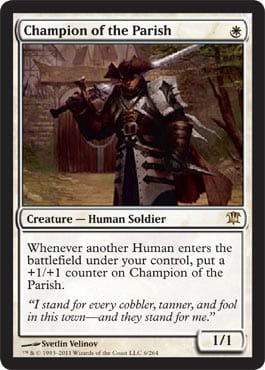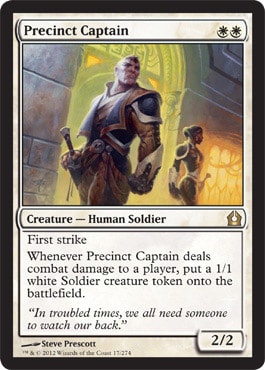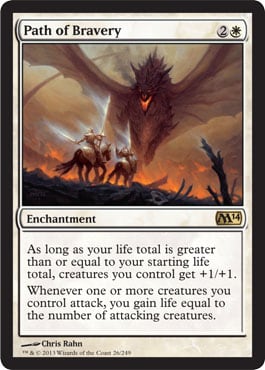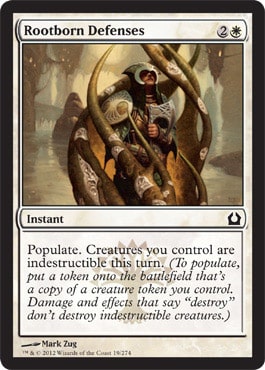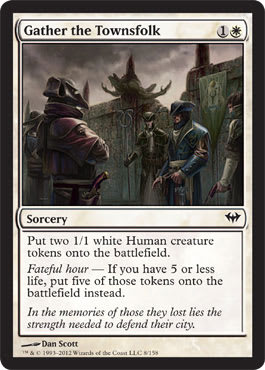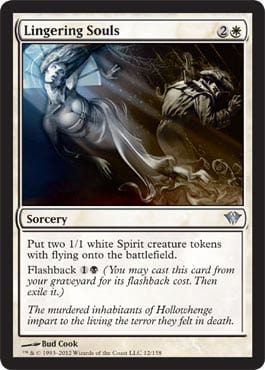Magic 2014 is Standard-legal now, and it seems that a tiny handful of cards is soaking up all the attention. This has had the effect of soaking up most of the value in the set as well, pushing down the prices of other perfectly playable cards. One of these cards is Path of Bravery. This card seems perfect for W/B tokens and possibly even other aggressive white decks, yet is currently sitting at $1.50 on CoolStuffInc. This makes it a prime candidate for budget decks, and aggressive white decks are usually fairly inexpensive to begin with. Here's the list I came up with.
"Brave Tokens"
- Creatures (12)
- 4 Champion of the Parish
- 4 Doomed Traveler
- 4 Precinct Captain
- Spells (25)
- 2 Brave the Elements
- 3 Orzhov Charm
- 4 Midnight Haunting
- 4 Gather the Townsfolk
- 4 Lingering Souls
- 4 Intangible Virtue
- 4 Path of Bravery
- Lands (23)
- 13 Plains
- 9 Swamp
- 1 Vault of the Archangel
- Sideboard (15)
- 3 Rest in Peace
- 3 Rootborn Defenses
- 3 Oblivion Ring
- 3 Celestial Flare
- 3 Dead Weight
The Threats
Champion of the Parish is slightly less effective here than in a dedicated Human tribal deck, but you can still expect it to be a 3/3 in most of your games thanks to Doomed Traveler, Precinct Captain, and Gather the Townsfolk. That makes it a valuable early threat that helps you put your opponent on his heels immediately. From that point, there are only two options for fighting this deck, both of which are losing propositions for your opponent. He can try to race, which is made incredibly difficult by cards like Path of Bravery and Vault of the Archangel, or he can engage you in a war of attrition by trading off creatures. Of course, since most of your creatures come in pairs, this is a war you're likely to win.
Doomed Traveler doesn't have as much punch as Champion of the Parish, but it can often get in even more damage in the long run thanks to the fact that it gives you a flying Spirit token when it dies. It's also a better draw than Champion later in the game. It often allows you to block a large creature like Thragtusk, and it gives you an even better threat to swing back with on your turn. In addition, it leaves you with a creature on board after a Supreme Verdict or Bonfire of the Damned, helping you keep the pressure on your opponent.
Precinct Captain is a fairly average threat by itself. A 2/2 with first strike isn't exactly the greatest deal for 2 mana, but its ability is what really makes it shine in this deck. Normally, pumping out a 1/1 Soldier token or two isn't anything special, but in a deck built around the idea of playing a million 1/1s and making them awesome, a few extra creatures can really do some work. It often gets to the point where the right play for your opponent is to block with his creature and let it die to first strike, since if Precinct Captain hits, that creature would later be trading with the token you just made anyway.
Gather the Townsfolk allows Champion of the Parish to attack for 3 on turn two, putting you off to a blazing start. With eight pump effects in the deck, it also usually provides you with 4 total power for 2 mana. Although fateful hour won't come up often, you can sometimes play into it against an aggressive deck, taking a bit more damage than you need to in order to allow you to make five tokens and come back in a big way.
Lingering Souls is the heart and soul of this deck. It provides an immense amount of value and longevity, making four evasive creatures with just one card. Since your four Spirit tokens will usually be swinging for 8 damage or more, this card has the potential to end the game all by itself. Do note, however, that these days, you need to be conscious of Scavenging Ooze when deciding when to flash it back.
Midnight Haunting may only give you half the value that Lingering Souls does, but the fact that it's an instant can sometimes make a huge difference. When your opponent casts a spell like Supreme Verdict or Bonfire of the Damned, being able to cast Midnight Haunting and attack immediately can be crushing.
The Support
Intangible Virtue is the card that's been making token decks work since Innistrad, providing a boost to your team as well as vigilance. When you have an army of creatures that your opponent can't block, vigilance is pretty much the greatest thing ever, allowing you to attack with everything every turn without fear of repercussions. The only downside here is that real creatures such as Champion of the Parish, Doomed Traveler, and Precinct Captain don't benefit, although the latter two will usually make tokens that will.
After playing with it, I have to say that Path of Bravery might even be better than Intangible Virtue. It boosts all your creatures, not just the tokens, and although it might seem that it's only conditionally good, in practice, that's not the case at all. Path of Bravery gives your creatures +1/+1 in the matchups where you really want it. When fighting midrange and control decks that seek to drag things out, Path of Bravery will help you win the game much faster. Against more aggressive decks, your life total generally won't be greater or equal to your starting life total, which is what turns most people off the card. However, Path of Bravery has a second ability that's great in these situations. Although most decks won't want to be attacking when fighting aggro, Path of Bravery will give you 4 or more life every turn if you do, which can be a pretty tough obstacle for an aggressive deck to overcome. Even if you're attacking for significantly less damage than your opponent, Path of Bravery can allow you to win the race.
Orzhov Charm's life-loss may seem to counteract Path of Bravery, but realistically, the 2 or 3 life you lose from killing an opposing creature is rarely going to make the difference between being above 20 or below it when you're gaining life with every attack. If your opponent is blocking, one attack should gain you back more than what you lost to Orzhov Charm, and if he is attacking, you're probably not that close to 20 anyway—in addition to the fact that you were going to lose that much life or more from the creature's attack. Although the removal option is by far the one you'll use most, bringing a Champion of the Parish or Doomed Traveler back from the graveyard can occasionally be relevant, and the option should be kept in mind.
Brave the Elements was a valuable card for white weenie decks when it was first printed, and it should be the same now. It's particularly effective at fighting Bonfire of the Damned and Mizzium Mortars, which can cause problems for token decks. You can use it to protect your creatures from an Angel of Serenity, stop a removal spell, or just make your opponent's Thragtusks and Beast tokens unable to block for a turn. The versatility of this spell is a big part of what makes it so good.
The Sideboard
Dead Weight helps make it easier to battle aggressive decks, killing most creatures for only 1 mana. This usually allows you to use a removal spell and put some threats on the board in the same turn, whereas Orzhov Charm can often take your entire turn if you need to use it early.
Oblivion Ring helps fight planeswalkers, and it can be used to get rid of Unflinching Courage against Bant Hexproof. Basically, if the Orzhov Charms aren't cutting it for whatever reason, swap for these.
Rest in Peace significantly slows down Junk Rites, making the deck play like your average midrange strategy instead of reanimating an Angel of Serenity on turn four. Where it really shines, however, is against The Aristocrats. With Blood Artist and Skirsdag High Priest out of commission, the only remaining part of the deck you actually care about is Blasphemous Act and Boros Reckoner, for which you can save your Orzhov Charms. And what if your opponent is playing the Junk version? With Blood Artist and the Priest taken care of, there's not really anything left that can threaten you.
Rootborn Defenses helps you murder control decks, effectively countering the uncounterable Supreme Verdict. Stopping that Verdict will often spell doom for your opponent, allowing you to kill him as soon as you untap. After all, he was playing Supreme Verdict to stop you from killing him. All you have to do is stop him from stopping you. Rootborn Defenses can also be used against Ratchet Bomb if you encounter any of those. Although Stony Silence is the more effective option, I'm not expecting to see a ton of Ratchet Bombs in sideboards at the moment, so the dual-purpose card should be enough.
Celestial Flare makes life very difficult for Bant Hexproof. Although traditional sacrifice spells are often thwarted by an Avacyn's Pilgrim or Voice of Resurgence, those creatures generally won't be attacking, especially when you have some large tokens to block with. Note that if you're getting rid of Geist of Saint Traft, you'll need to cast Celestial Flare with the Angel trigger on the stack. Otherwise, your opponent can just sacrifice his token. It's also worth noting that if your opponent does attack with other creatures, and you can kill them all through combat, you can cast Celestial Flare after combat damage has been dealt to force your opponent to sacrifice his only remaining attacker.
Notes
With little picture of what the Standard format might look like in the coming months, and with my own experience testing an almost identical deck for my own use, I thought a few notes on playing the deck would be more valuable than a playtest match.
The biggest thing you need to pay attention to with this deck is the order in which you cast your spells. It's very easy to screw up just a little bit, and you can sometimes lose a game because of it. For example, most of the time, you want to cast Precinct Captain rather than Gather the Townsfolk on turn two, even if it means that your Champion of the Parish attacks for 2 instead of 3.
The timing of when you cast your Glorious Anthem effects is even more important. You'll often have the option of casting either Path of Bravery or Lingering Souls/Midnight Haunting, and choosing the wrong one can be a significant mistake.
The first thing you'll want to look at is how much damage you're dealing. Count the number of creatures you're pumping this turn, and compare that to the total damage the extra creatures will deal once pumped by the anthem. For example, if you have Doomed Traveler and two Human tokens on the battlefield on turn three, Path of Bravery will give you 3 extra damage that turn, whereas casting Lingering Souls will give you 4 extra damage next turn. Casting Path of Bravery immediately, however, will gain you 1 more life, with two attacks with three creatures instead of one with five. If the anthem is Intangible Virtue on the other hand, casting it immediately will only give you 2 extra damage, while waiting will give you 4 next turn.
Other factors, like the potential for your opponent to cast Bonfire of the Damned for 1 if he has it in hand, should also influence your decision to cast an anthem. Another factor to consider is how you're using your mana. With the same board as before, say your hand is Path of Bravery, Intangible Virtue, Lingering Souls, and a land. Now, casting Path of Bravery is probably better than casting Intangible Virtue right now, but if you do that, you're probably just casting Lingering Souls next turn. If you cast Lingering Souls now, you can flash it back next turn as well as cast Intangible Virtue to pump your creatures. Which option is correct depends on the many factors you've already learned to think about in Magic, such as board state, cards your opponent might have, and so on. Just remember to fully consider the ramifications of which spell you're choosing to cast.
The final thing I'll touch on with this deck is to save your spells such as Orzhov Charm and Brave the Elements until you really need them. Using Brave the Elements to counter a removal spell is usually a bad decision, especially if your opponent is playing a deck with Bonfire of the Damned and/or Mizzium Mortars. Similarly, although large creatures like Thragtusk or the token from Advent of the Wurm are often tempting targets for removal, this deck can frequently afford to simply ignore large creatures while attacking with flying Spirit tokens and gaining life with Path of Bravery. Unless killing it will help you win almost immediately or prevent you from losing almost immediately, you're usually better off saving your removal for something like Restoration Angel that can actually block your Spirits. Running an unusual strategy like this greatly changes the value of different creatures and spells your opponent might have, so you need to reevaluate your assumptions.
Wrap-Up
That's all the time I have for today, folks, but I'll be back next week with another fun budget deck to explore. Until then, give this deck a try if it piqued your interest, and I'll see you next time.














